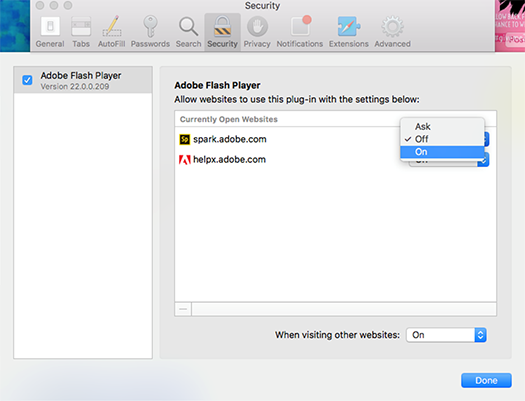Adobe Flash Player Macbook Pro

Mar 26, 2018 - Adobe Flash Player is a free software plug-in used by web browsers to view. How to set up Adobe Flash Player on various browsers.
Learn how to remove fake Adobe Flash Player update virus from Mac and thereby prevent the browser from being redirected to rogue software installation websites.
Update: February 2019
Outlook 2016 for Mac, the latest iteration of the email and calendaring app, is a worthwhile upgrade for existing users. But if you don't already use Outlook, the new edition probably won't offer. Outlook 2016 creates a new road-map for enthusiast users on Windows and Mac platform. Experts are believed that Outlook 2016 Mac is a boon for Office lovers under Macintosh environment while Outlook 2016 Windows provides richer and higher experience with email and calendar. Outlook on mac reviews. Outlook for Mac. The Move tool also shows a few recent folders to help you file mail. On the other hand, there’s no equivalent of the Quick Step tool for quick filing and you don’t see favourite folders you’ve picked the way you do on Windows, just the system folders like Archive, News Feed and Clutter. Outlook and the Mac have a long and ugly history. For many years, there were, at best, rudimentary and semi-functional Mac versions of Outlook, which created a self-fulfilling cycle that the Mac was not ready for or worthy of use in the enterprise.
The Adobe Flash Player update virus is one of the common ways cybercriminals try to deposit additional harmful code onto a Mac. It usually operates in tandem with such threats as bogus system utilities that report non-existent problems and thus attempt to manipulate users into activating the licensed copy of the scareware. This type of a ruse can be used to promote such unwanted apps as Mac Auto Fixer or Mac Cleanup Pro. Both will run phony scans of the host system and claim to detect hundreds of issues – ones that aren’t there for real. The targeted Mac users therefore deal with a double contamination scenario, where they first encounter recurrent and really annoying instances of browser rerouting and then suffer the consequences of counterfeit software activity. It’s the early stage of the brainwashing that is backed by the Adobe Flash Player update virus popups.
The reason why the architects of this trickery have added the Flash Player to the mix of their shenanigans is probably because it’s a commonly used program trusted by most users. The caveat is that a completely different piece of code is camouflaged as the explicitly stated software. This part of the incursion is usually isolated to the web browser, although there are rare cases where the misguiding popups appear when the browser is closed. The virus manifests itself through random redirects to a site that instantly displays a popup alert saying, “Adobe Flash Player is out of date”. Meanwhile, a prompt at the top of the page layout may wrongfully emphasize that “Latest version of Adobe Flash Player is required to encode and/or decode (Play) audio files in high quality”. Everybody likes quality multimedia content, so a lot of users end up falling for this trick.
In all of these adverse situations, those who pay attention to detail will notice that there is something wrong with such a recommendation. First off, the URL of the website that generates these Adobe Flash Player update popups is a giveaway. Obviously, it has nothing to do with the genuine vendor, being clearly designed to mimic the legit update workflow. Furthermore, despite the fact that the alerts may provide a button to opt out, such as “Later” or “Cancel”, clicking it isn’t likely to close the dialogs for more than a few milliseconds. The pre-configured website script will relaunch the ads, so the victims may have to force quit Safari, Chrome, Firefox – or whatever browser is infected – to get the bogus notifications out of the way.
Special Offer
Fake Adobe Flash Player Update virus may re-infect your Mac multiple times unless you delete all of its fragments, including hidden ones. Therefore, it is recommended to download Freshmac and scan your system for these stubborn files. This way, you may reduce the cleanup time from hours to minutes. Download NowLearn how Freshmac works. If the utility spots malicious code, you will need to buy a license to get rid of it.
This troublemaking scenario tends to be bolstered by a malicious browser plugin or extension. The fake helper object modifies Internet settings, such as the homepage or search defaults, and may even interfere with the DNS server preset. This is what causes the redirects in the first place. What happens if you click “OK” and actually download the pseudo Adobe Flash Player update is a whole new attack layer. The affiliated harmful program will establish persistence on the Mac by adding itself to Login Items and utilizing antivirus evasion mechanisms. Then, it will start launching scans of the macOS, purporting to find numerous memory issues and security problems each time. Again, this routine is aimed at pressuring the victim into making a hasty decision to pay for the cyber-impostor’s licensed version. So much for the tactic. Speaking of the fix for the Adobe Flash Player update virus activity, the only method is to spot the components of the pest on the Mac and remove them. See below to learn how it’s done.
Fake Adobe Flash Player update virus manual removal for Mac
The steps listed below will walk you through the removal of this malicious application. Be sure to follow the instructions in the order specified.
• Open up the Utilities folder as shown below

• Locate the Activity Monitor icon on the screen and double-click on it
• Under Activity Monitor, find an entry that appears suspicious and shouldn’t be among the running processes, select it and click Quit Process
• A dialog should pop up, asking if you are sure you would like to quit the troublemaking process. Select the Force Quit option
• Click the Go button again, but this time select Applications on the list. Find the malicious entry on the interface, right-click on it and select Move to Trash. If user password is required, go ahead and enter it
• Now go to Apple Menu and pick the System Preferences option
• Select Accounts and click the Login Items button. The system will come up with the list of the items that launch when the computer is started up. Locate the likely culprit that doesn’t belong there and click on the “-“ button
Get rid of fake Adobe Flash Player update popups in web browser on Mac
To begin with, settings for the web browser that got hit by the Adobe Flash Player update Mac virus should be restored to their default values. The overview of steps for this procedure is as follows:
1. Reset Safari
• Open the browser and go to Safari menu. Select Preferences in the drop-down list
Steam is the biggest modern-day success story in terms of gaming content delivery. It was launched on Windows in 2003 - arriving on the Mac in 2010 - and has since grown to a user base of over 150. Steam is a platform for online games that lets you download the latest from the world of video games as they are released – an indispensable tool adopted by many publishers.  At the moment, the Steam gaming platform makes it possible for its users to buy and play a large range of games, as well as install and use a growing collection of gaming related software. Steam is one of the most popular online gaming stores for gamers everywhere and it's not just for PC, you can enjoy Steam on your Mac too! Here's how to install and download games using Steam for Mac. In case you haven't installed Steam on your Mac already, here's how. Go to steampowered.com in your.
At the moment, the Steam gaming platform makes it possible for its users to buy and play a large range of games, as well as install and use a growing collection of gaming related software. Steam is one of the most popular online gaming stores for gamers everywhere and it's not just for PC, you can enjoy Steam on your Mac too! Here's how to install and download games using Steam for Mac. In case you haven't installed Steam on your Mac already, here's how. Go to steampowered.com in your.
• Once the Preferences screen appears, hit the Privacy tab at the top. Find the option that says Remove All Website Data and click on it
• The system will display a confirmation dialog that also includes a brief description of what the reset does. Specifically, you may be logged out of some services and encounter other changes of website behavior after the procedure. If you’re okay with that, go ahead and click the Remove Now button
• In order to selectively clear data generated by certain websites only, not all of them, hit the Details button under the Privacy section of Safari Preferences
• This feature will list all websites that have stored potentially sensitive data, including cache and cookies. Select the one, or ones, that might be causing trouble and click the appropriate button at the bottom (Remove or Remove All). Click the Done button to exit.
2. Reset Google Chrome
• Open Chrome and click the Customize and Control Google Chrome menu icon
• Select Options for a new window to appear
• Select Under the Hood tab, then click Reset to defaults button
3. Reset Mozilla Firefox
• Open Firefox and select Help – Troubleshooting Information
• On the page that opened, click the Reset Firefox button
Get rid of Adobe Flash Player update virus using Freshmac removal tool
When confronted with malicious code like the Adobe Flash Player update virus on Mac, you can neutralize its toxic impact by leveraging a specially crafted system utility. The Freshmac application (read review) is a perfect match for this purpose as it delivers essential security features along with must-have modules for Mac optimization.
This tool cleans unneeded applications and persistent malware in one click. It also protects your privacy by eliminating tracking cookies, frees up disk space, and manages startup apps to decrease boot time. On top of that, it boasts 24/7 tech support. The following steps will walk you through automatic removal of the Adobe Flash Player update infection from Mac.
1.Download Freshmac installer onto your machine. Double-click the Freshmac.pkg file to trigger the installer window, select the destination disk and click Continue. The system will display a dialog asking for your password to authorize the setup. Type the password and click Install Software.
2. Once the installation has been completed, Freshmac will automatically start a scan consisting of 5 steps. It scans cache, logs, unused languages, trash, and checks the Mac for privacy issues.
3. The scan report will then display your current system health status and the number of issues detected for each of the above categories. Click the Fix Safely button to remove junk files and address privacy issues spotted during the scan.
4. Check whether the Adobe Flash Player update virus problem has been fixed. If it perseveres, go to the Uninstaller option on Freshmac GUI. Locate an entry that appears suspicious, select it and click Fix Safely button to force-uninstall the unwanted application.
5. Go to Temp and Startup Apps panes on the interface and have all redundant or suspicious items eliminated as well. The Flash Player update malware shouldn’t be causing any further trouble.